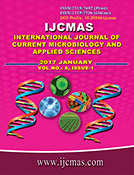


 National Academy of Agricultural Sciences (NAAS)
National Academy of Agricultural Sciences (NAAS)

|
PRINT ISSN : 2319-7692
Online ISSN : 2319-7706 Issues : 12 per year Publisher : Excellent Publishers Email : editorijcmas@gmail.com / submit@ijcmas.com Editor-in-chief: Dr.M.Prakash Index Copernicus ICV 2018: 95.39 NAAS RATING 2020: 5.38 |
Despite great improvements in global oral health status, dental caries still remain one of the most prevalent diseases. Yet some brands of toothpastes claim to be effective antimicrobial agents. This study was therefore designed to evaluate the in vitro antimicrobial activity of commercially available toothpastes against some microorganisms involved in tooth infections. Agar disc diffusion method was used to test the antimicrobial activity of ten different toothpastes at various concentrations (1:2; 1:4 and 1:8 dilutions) against Porphyromonas gingivalis, Escherichia coli, Staphylococcus aureus and Candida albicans. The sensitivity of tested toothpastes towards each microorganism was expressed as a percentage of the mean clear zone diameter. Statistical analysis was performed with the help of Statistical Package for Social Sciences (SPSS) version 19 with significance considered at pP. gingivalis at various levels: Signal (67.3%), Colgate Protection Max (63.6%) and Colgate Herbal (62.7%). Test concentration of 1:2 dilution of these toothpastes was most effective on E. coli with clear zones ranging from 11.7 mm (Oral B) to 23.3 mm (Aloe vera). Generally the inhibition of S. aureus growth by these dentifrices even at higher test concentrations was weak, with clear zones ranging from 8.3 to 15.0 mm. No growth inhibitory activity was observed for Mericle (least effective in bacterial growth inhibition) against C. albicans at all the tested concentrations. Dentix (25.8%), Airsun (30.7%), Special 2 plus (22.2%) and Oral B (22.7%) were equally less sensitive to this microorganism compared to the controls. Our in vitro study has shown antimicrobial activities of the mentioned toothpastes against P. gingivalis, E. coli, S. aureus and C. albicans. Thus they can be used to control dental infections.
 |
 |
 |
 |
 |